Food Manufacturing News
Worldwide Fruit aims to double Envy exports
Apple marketer Worldwide Fruit has said it plans to more than double exports of New Zealand apple variety Envy to Asia this year after successfully sending 2.5 containers to Singapore last year.
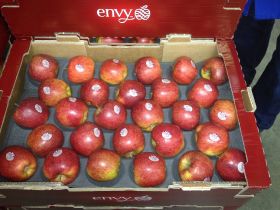
Speaking at last week’s National Fruit Show, Technical Director Tony Harding told the Fresh Produce Journal that the company is taking a different approach this year, by giving growers specific standards for exporting Envy. The aesthetic qualities required by Asian markets, such as colour and skin finish, are different to European customers, he said.
Elsewhere, Harding said Jazz remains a primary focus for Worldwide Fruit and said the variety is performing “extremely well”.
“Jazz is performing extremely well, and it’s ahead of the market with returns and sales. It’s a nice crop from Europe and the UK. It looks very good and eating quality is very high,” he said.
On pears, the company has launched new early blush variety Qtee this year, which crops “very well” and arrives onto the market earlier than Conference. “It’s gone very well, we’ve sold small volumes of UK-grown fruit into Waitrose and some wholesalers. The season has just finished but we have high hopes for the future,” Harding said.
Speaking about the wider top-fruit market, Harding said the market has been “hard work” in recent weeks, although some varieties have bucked the trend.
“It has been particularly tough for red dessert apples and Cox, though other varieties are performing better. There is a strong appetite for Gala and Conference.
“We are trying to improve returns on last year, and so far so good. The value of the crop is reflected in the volumes that are out there.”
Nationwide Produce and Three Musketeers are donating 50p from every box of mint potatoes to support the Poppy Appeal
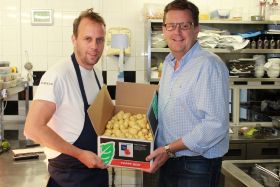
Nationwide Produce and Suffolk potato grower Three Musketeers will donate 50p to The Royal British Legion from every box of mint salad potatoes they sell during the three-week appeal.
After Edward Blanchard from Three Musketeers, and Nationwide’s Tim O’Malley, were moved by visiting Ypres, they decided to replace the mint leaf on packaging with a poppy in aid of the charity.
Backed by Michelin-starred chef Mark Poynton, the ‘Poppy Boxes’ went on sale on Wednesday 21 October at wholesalers and foodservice firms. O’Malley said: “This is a unique opportunity for buyers to support the Poppy Appeal while also backing British farming.
“We’re only five days into this promotion and the uplift in sales would already indicate that the amount we will raise for the Poppy Appeal will be closer to £15,000 than our original estimate of £10,000. The general reaction to this promotion from our customers has been very positive.”
Blanchard said it is “a great honour to help remember those that shouldn’t be forgotten” and asked the produce industry to support the initiative. “Chefs and buyers throughout the country, you can help us to raise some much-needed funds. Simply buy a product you already enjoy or swap from your usual supply and order a ‘Poppy Box’ of our Mint salad potatoes for the first time,” he said.
Sierra Exportadora urges more producers to get involved in lucrative export industry
Peruvian blueberry exports are expected to grow to US$70m in 2015 according to government agency Sierra Exportadora. Chief executive Alfonso Velasquez Tuesta said Peru would close the year with a planted area of 2,800ha.
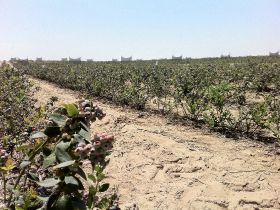
“From zero exports in 2009 to US$30m in 2014, Peru has climbed up the world rankings and is now the tenth biggest exporter of blueberries,” Velasquez said.
The projection is based on the continued strong growth in planted area, an increase in average yields from 8 tonnes to 10 tonnes and the growing number of young plants reaching maturity.
Velasquez noted that if more small producers joined forces to create farms of 25-30ha this would result in a big jump in the country’s blueberry export volume.
The US is the biggest market for fresh blueberries, importing around US$600m last year. This was followed by the UK with US$197m, then Canada and the Netherlands in third and fourth place.
“Peru should be aiming to fill the September-October window between the North American production, season which begins to wind down in August, and the start of the Chilean season in November,” Velasquez said.
On average, Peru produces 10-15 tonnes of blueberries per hectare. Velasquez claimed that since each hectare of production required an investment of US$40,000-US$45,000 and a yield of just 5 tonnes sold at US$10 per kg would generate an income of US$50,000, growers would already cover their start-up costs in one year.
China is now the biggest market for UK pork exports outside of Europe, according to AHDB Pork, with strong demand for offal likely to continue to grow.
According to Jean-Pierre Garnier, AHDB Pork’s export manager, the current Chinese market remains full of opportunities. “The conditions in China are favourable. Prices have been rising and there’s not a lot of pork available on the market at the moment. We cannot say forever, but for the foreseeable future we can see strong growth.
It is estimated that China consumes half the pork in the world, he added. However, there is still work to do to ensure that the value of exports keep pace with volumes. “It is important to us to improve the value of what we export to China in terms of added value and making more branded products, as well as better packaging, to make it better for the consumer,” said Garnier
At the moment, the UK exports 28% of the pork it produces. In the month of August, both imports and exports of the meat increased. At just over 30,000 tonnes, pork imports were 8% higher than they were in August last year.
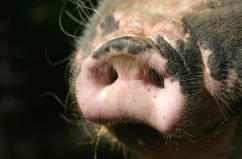
Spain has experienced a 50% rise in export volumes of pork to the UK, according to the levy board. Belgium and Denmark are also key suppliers of the meat, with both countries seeing a 14% rise.
Imports and exports remain a key area for progression, but pig slaughterings in the EU aren’t experiencing the same growth.
Although a rise in slaughterings is expected to continue until at least the middle of next year, they have slowed compared to the first half of 2015, according to AHDB Pork.
This conclusion is constructed around an analysis of figures presented by the European Commission’s pigmeat forecast working group. A report from the levy board highlighted that: “Pig slaughterings are forecast to rise by around 2% year on year in the second half of 2015, with growth slowing to around 1% in the first half of 2016.”
Furthermore, it said that many member states are predicting that pig levels will remain similar to year earlier levels. The strong growth by Spanish output is set to outweigh this stability, though this may also begin to relax by the second quarter of next year.
A survey that questioned 115 consumers found Pink Lady was the favoured snack, beating crisps, chocolate and celery
Branded apple Pink Lady has beaten off competition from celery, carrots and milk chocolate to become the nation’s top snack, according to a new consumer survey.
Conducted by Pink Lady brand manager Coregeo, the survey asked 115 consumers to rate snacks for taste, satisfaction, emotion and sensory attributes by either choosing a number on a nine-point scale, or selecting from a list of words that best described their reaction. This was dubbed the ‘Scale of Snackisfaction’ and analysed for qualitative consumer feedback on the different snacking options.

Pink Lady was rated top among consumers, followed by carrots and celery. Other snacks tested were milk chocolate, a shortbread finger, unsalted mixed nuts and crinkle cut ready salted crisps.
The survey forms part of the wider ‘Snackisfaction’ campaign, run by marketing agency MCG on behalf of Coregeo, which aims to position Pink Lady as the snack of choice. It was launched in April following a study from Leatherhead Food Research that demonstrated how subjective emotions such as guilt or excitement can influence the satisfaction rating of a sensory experience.
Other activity has included a ‘Tweet to eat’ roadshow and experiential marketing concept, where consumers could tweet the hashtag #snackisfaction to receive a Pink Lady by post.
During the campaign, 80,000 Pink Lady apples were distributed, coverage generated over 345,500 engagement opportunities on social media and Twitter activity rose by 11 per cent, Coregeo said.
Along with continuous investment in quality control and standards, this targeted consumer marketing has led to Pink Lady seeing a nine per cent year to date growth.
Michelle Toft, Coregeo chief marketing officer, said: “It’s no surprise to us that the Snackisfaction campaign was a huge hit with consumers because Pink Lady is fast becoming the fresh-fruit snacking favourite for the growing number of consumers who recognise its uniquely satisfying combination of taste, texture and refreshing nutritional qualities.
“In fact Pink Lady excelled in terms of tastiness and appearance and overall was more snackisfying than other types of snacks, showing that it’s a serious contender as a satisfying snack.”
The Jaffa Juniors tour, which launched in April 2015 in tandem with the Tesco Eat Happy scheme, has worked with 5,000 children
An initiative launched by citrus specialist Jaffa in conjunction with the Tesco Eat Happy Project is celebrating after reaching a rather significant milestone in its educational program.

The Jaffa Juniors tour, which launched in April 2015, has put its 5,000th child through the scheme as it undertook lessons at Grimsargh St Michael’s Church of England School in Preston, Lancashire.
Roy Van Grevenbroek, of Jaffa, said: “The Jaffa Juniors tour was launched because as a brand we recognise the importance of education to children of where their food comes from and how it is made..
“The tour was launched in conjunction with the Tesco Eat Happy project and is a great way of interacting with kids on a 1-2-1 and group basis and getting over the importance of fresh produce in our everyday diets.”
The lessons are aimed at Key Stage 1 and 2 children covering infant schools nationwide, and were developed in conjunction with education resource specialists TTS.
Van Grevenbroek added: “It is important that we educate from an early age to build the recognition through teens and into early adulthood.
“The tour has been successful in doing just that and is a testament to both the support given by the Tesco Eat Happy project and the schools themselves for being open to this outside interaction. As a brand we have made an ongoing commitment to the program which will extend into 2016 and beyond.”
The Jaffa brand was formed over 50 years ago in Israel. The brand is imported by Israeli grower/exporter Mehadrin, and distributed to Tesco stores in the UK via AMT.
Bernard Matthews has appointed Andy Deutsch to the new role of chief operating officer
Deutsch, who joined the company on the 5th of October, has worked in the food industry for more than 30 years, across a wide range of roles and organisations.
He brings extensive experience in foodservice, chilled and frozen sectors to the poultry processor’s management team.

“We are delighted to have Andy joining us at what is a very exciting time for the company, as we launch our new brand identity, start our sponsorship of the Simpsons on Channel 4 and introduce British chicken products to our portfolio,” said Rob Burnett, CEO of Bernard Matthews.
“Andy’s experience and understanding of the food industry will play a key role in helping deliver our ambitious plans for the future.
Deutsch added: “Bernard Matthews is one of the UK’s most iconic food brands so it’s a real pleasure to be given the opportunity to be part of the development and growth of the business in this new phase in the company’s history.”
In his new role as chief operating officer Deutsch will be responsible for various different things,including: procurement, supply chain, planning and production.
Before joining the business he worked for Hain Daniels, where he held MD roles in Food to Go & Desserts and its Chilled & Frozen subsidiary.
Previous he also had senior roles at Vion, Northern Foods and Fisher Foods and has worked with a range of consumer brands and retail own-label products.
Bernard Matthews, the largest turkey producer in the UK, is headquartered near Norwich in Norfolk and employs approximately 2,000 people across East Anglia.
It is a totally integrated food business, allowing for full traceability across its 56 farms, which rear nearly seven million turkeys per annum.
Through its farming and production business the company supplies nearly half the homes in the UK with tasty, versatile and affordable turkey and chicken meal time solutions.
Underlying profits for the first half of its financial year were £354 million, 55% down on the same period last year
Tesco has endured a further fall in profits.

Underlying profits for the first half of its financial year were £354 million, 55% down on the same period last year.
Its pre-tax profit was £74m, compared with a loss of £19m for the same period a year ago.
UK like-for-like sales were down 1.1% in the second quarter, an improvement from the first quarter’s fall of 1.5%. International sales were up 1%
In February, Tesco reported the worst results in its history, with a record statutory pre-tax loss of £6.4bn for the year to the end of February 2015.
Chief executive Dave Lewis said: “In the UK, we continue to improve all aspects of our offer for customers, resulting in volume growth which is allowing us to create a virtuous circle of investment.
“Our transformation programme in Europe has accelerated growth and reduced operating expenses, and in Asia, we have increased market share in challenging economic conditions.”
The supermarket is still under a criminal investigation by the Serious Fraud Office (SFO) after it admitted overstating its profits by £263m nearly a year ago.
Tesco’s Q2 results, David Gray, retail analyst at Planet Retail, said: “As expected, the numbers this morning indicate further signs of stabilisation at Tesco’s domestic unit, with like-for-like declines narrowing on those reported at Q1. There were also encouraging signs on volumes at Tesco, indicating this is a volume-led recovery.
“These figures have firmly cemented the split in the UK mid-market into two camps – Tesco/Sainsbury’s showing signs of recovery and Asda/Morrisons being the laggards. Considering Tesco was in the throes of the accounting scandal just 12 months ago, being in the former camp is an achievement in itself.
“Despite positive numbers in CEE, problems are persisting in Asia where like-for-likes remained flat in Q2 – an improvement, yes, but not stellar growth. Although Tesco’s Chairman has recently reaffirmed its commitment to the geographies in which it now trades, long-term disposals could still be on the cards considering the relative weakness in the company’s balance sheet and the lack of a dunnhumby sale.
“With Korea already culled, Malaysia is the obvious next market at risk with limited growth potential. However, it is profitable and well-established and so could command a decent price. In CEE, markets like Poland would generate the largest windfall considering its size relative to neighbouring markets and the presence of a string of international operators that could be would-be buyers. Most of these aforementioned markets look safe – for now at least.”
With the arrival of autumn, ingredients supplier Unbar Rothon has unveiled six imaginative sausage flavours, created to establish something unique for the market. Cinnamon-flavoured pork and toffee apple, and a warm and spicy pork and mango chutney are among the new flavours.
“We recognise that it is all too easy for an industry to become attached to the familiar and get stuck in the mud,” explained Richard Rothon, director of Unbar Rothon.
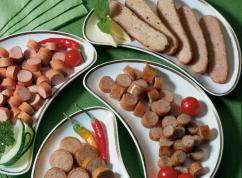
Also found among the sausage mixes are a sweet and spicy pork, leek, apple and chilli mix and a spicy apple and black pudding mix. Completing the range are two vegetarian-options, which consists of the flavourings; smoky garlic and thyme, and parsnip honey and thyme.
Rothon added: “We have worked very hard to produce new and interesting ideas, which will make a food offer more interesting – and profitable.”
As well as the new range of sausage flavourings, the business has unrolled a series of ingredients designed for the meatballs and stuffing market.
Leading the launch is a sweet orange and tart cranberry mix. Other flavours are; leek and black pepper, red pepper and shallot, and sage and onion with a hint of black pepper.
Unbar Rothon is not the only company that has noticed a trend for something different in the sausage market.
Snowbird Foods claims to be the leading cooked sausage and meatball supplier. Its products are fully cooked and frozen at factory stage, which allows them to be quickly reheated for the food-to-go and buffet sectors.
The standard Cumberland, Lincolnshire and pork sausages are claimed to be a prepared-to-order breakfast solution that can be microwaved from frozen.
The company has also developed a new Mini Meat Bites range, consisting of cocktail and other small sausages with pork, lamb, beef, chicken and turkey varieties.
“These award-winning bites have attracted a lot of interest and their versatility has enabled us to develop a new market segment in the ingredients area,” said Snowbird’s commercial and marketing director Roy Anderson.
As well as the mini sausages for the buffet market, Snowbird Foods has developed a pork and spiced chorizo sausage that it claims will heat in seconds in the microwave.
The sausage contains an 80% pork content and is presented in a beef collagen casing. They are made using diced chorizo and flavoured with smoked paprika, salt, black pepper, ginger, parsley and garlic.
Anderson explained: “Our chorizo is an ideal solution for those restaurants looking for a sausage that is so different their outlet will stand out from the crowd and attract repeat business.”